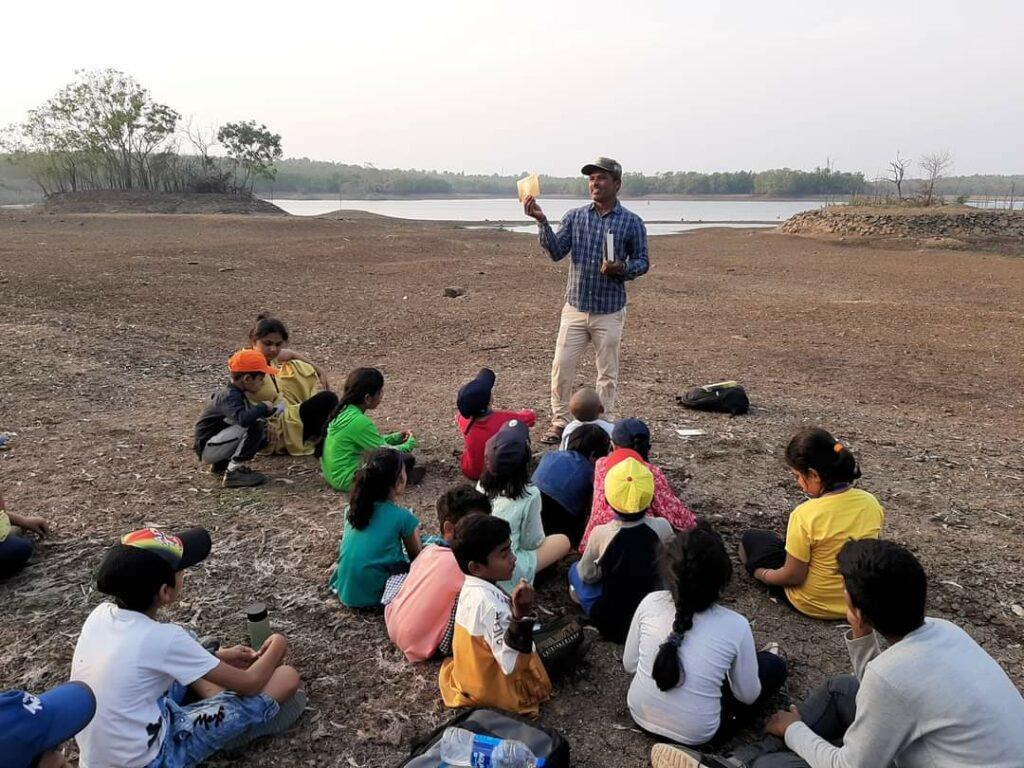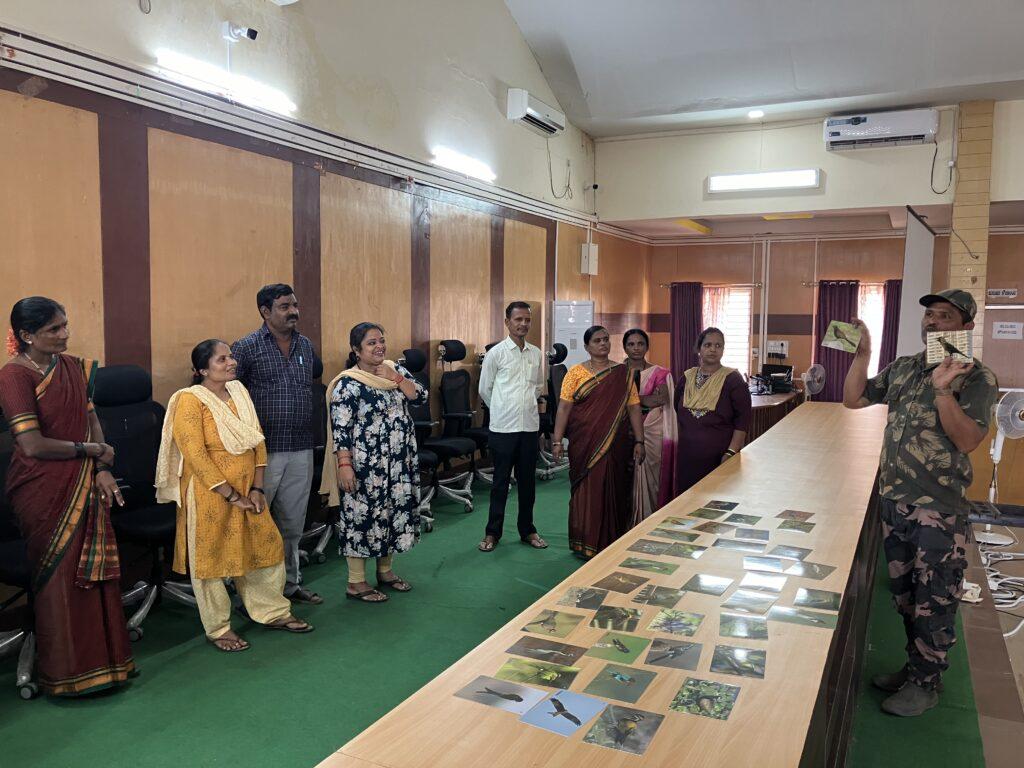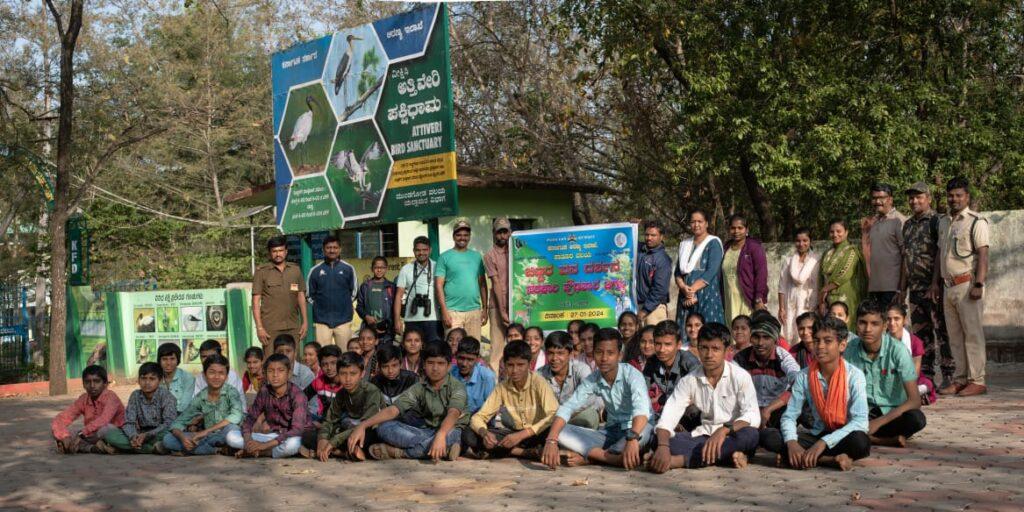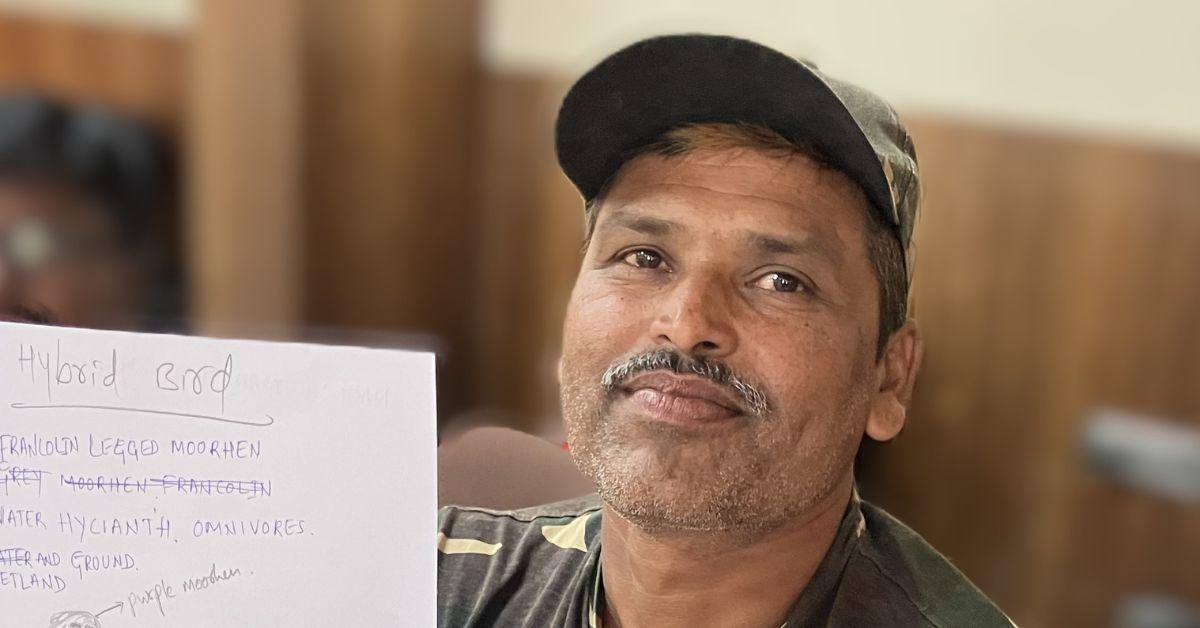Meet an Educator is a monthly series by Early Bird, where we feature the work of educators across India who are actively spreading the joy of birds and nature. This month’s featured educator is Mahesh Yamoji, a nature educator from Karnataka who works to create awareness about birds among high school students.
Do tell us about yourself, where you are from, and your work.
My name is Mahesh Yamoji. My hometown is Attiveri Bird Sanctuary in Haveri district, Karnataka. I previously worked as an outsourced bird watcher in the Forest Department for ten years. Currently, I am working as a temporary employee at Karnataka Folklore University in Gotagodi village, Shiggavi taluk, Haveri district, Karnataka. During my free time and holidays, I am working on creating awareness about birds among high school children who are interested in the environment and birds.
What excites you about the natural world?
Bird watching is a wonderful and thrilling experience. The colours of the birds, the flight, the call, the migratory process, the unique design of the nests, etc. are things that particularly excite me.
When and how did you get interested in bird/nature education?
When I worked at the Attiveri Bird Sanctuary, I developed interest while interacting with visitors and school children who visit the sanctuary to watch birds. Now, I often share information I know about birds by visiting schools or with anyone who shows interests in birds.

What do you hope to achieve through your education work?
It is my opinion and wish to create awareness among children at the primary or high school level about the importance of birds in maintaining balance in the environment.
Why do you believe it is important for children to learn about birds or connect with nature?
Without nature there is no human life. Similarly, learning about birds is like studying nature. Therefore, we need to make children more interested in learning about birds. For example, in the United States of America, which has a population of only 27 million, there are nine million bird and nature watchers. We have to introspect how many bird watchers we have in our country with a population of over 120 crores.
What tools or resources have helped you in teaching about birds? Can you describe an approach that has worked exceptionally well for you?
As ornithologist Dr. Salim Ali suggested “to teach about birds, bird guide and a pair of binoculars for observation are helpful.” Bird posters, flashcards, educator’s handbook, etc. published by NCF are helpful too. “What’s that bird?” flashcards that provide information about common birds are interesting and have worked well for school children.

Do share any memorable moment or experience you have had in teaching kids about birds/nature. Can you recall any insightful instance that shaped your perspective?
Rather than teaching children about birds or nature, we get to learn some things from children who are growing up in a rural environment, something that we may not be aware of. One memorable moment I can think of is, while teaching about birds to children at Vivekananda Ashram, a boy from North Karnataka asked, “What can we learn from the life of birds?” My response was that “the simple life birds lead, lack of desire to accumulate wealth for the future, males and females being aware of their responsibilities, and most importantly, to stay happy are few lessons we can learn by observing life of birds.”
Have you noticed any changes in your learners after they received exposure to birds and nature-based learning? If yes, what are they? If not, why do you think that is?
After being exposed to birds and nature-based learning, there have been minor changes in my learners. They happily share about sighting the birds in their agricultural fields and around their houses. Similarly, they have bought the necessary equipment and books for bird watching.
I have also noticed that though some people are interested in this subject, since they are busy with academics they feel birdwatching can be done during later years and so do not pursue this activity.

The number of people who watch birds and are documenting them should increase. Observing and photographing of birds should be done without disturbing the personal life of the birds. Most important is to learn to love birds, since without love there is no conservation.
Given below is a Kannada version of the interview.
‘ಶಿಕ್ಷಕರನ್ನು ಭೇಟಿ ಮಾಡಿ’ ಎಂಬುದು ಅರ್ಲಿ ಬರ್ಡ್ನ ಮಾಸಿಕ ಸರಣಿಯಾಗಿದೆ, ಇಲ್ಲಿ ನಾವು ಪಕ್ಷಿಗಳು ಮತ್ತು ಪ್ರಕೃತಿಯ ಸಂತೋಷವನ್ನು ಸಕ್ರಿಯವಾಗಿ ಹರಡುತ್ತಿರುವ ಭಾರತದಾದ್ಯಂತ ಶಿಕ್ಷಣತಜ್ಞರ ಕೆಲಸವನ್ನು ವೈಶಿಷ್ಟ್ಯಗೊಳಿಸುತ್ತೇವೆ. ಪ್ರೌಢಶಾಲಾ ವಿದ್ಯಾರ್ಥಿಗಳಲ್ಲಿ ಪಕ್ಷಿಗಳ ಬಗ್ಗೆ ಜಾಗೃತಿ ಮೂಡಿಸಲು ಕೆಲಸ ಮಾಡುವ ಕರ್ನಾಟಕದ ಪ್ರಕೃತಿ ಶಿಕ್ಷಣತಜ್ಞ ಮಹೇಶ್ ಯಾಮೋಜಿ ಈ ತಿಂಗಳ ವೈಶಿಷ್ಟ್ಯಗೊಳಿಸಿದ ಶಿಕ್ಷಕರಾಗಿದ್ದಾರೆ.
ನಿಮ್ಮ ಬಗ್ಗೆ ನೀವು ಎಲ್ಲಿದ್ದೀರಿ ಹಾಗು ನಿಮ್ಮ ಕೆಲಸದ ಬಗ್ಗೆ ತಿಳಿಸಿ
ನನ್ನ ಹೆಸರು ಮಹೇಶ್ ಯಾಮೋಜಿ. ನನ್ನ ಊರು ಅತ್ತಿವೇರಿ ಪಕ್ಷಿಧಾಮ. ನಾನು ಈ ಹಿಂದೆ ಹತ್ತು ವರ್ಷಗಳ ಕಾಲ ಅರಣ್ಯ ಇಲಾಖೆಯಲ್ಲಿ ಹೊರಗುತ್ತಿಗೆಯ ನೌಕರನಾಗಿ ಪಕ್ಷಿ ವೀಕ್ಷಕ ನಂತೆ ಕೆಲಸ ಮಾಡಿರುತ್ತೇನೆ. ಪ್ರಸ್ತುತ ಹಾವೇರಿ ಜಿಲ್ಲೆಯ ಶಿಗ್ಗಾವಿ ತಾಲೂಕಿನ ಗೊಟಗೋಡಿ ಎಂಬ ಗ್ರಾಮದಲ್ಲಿರುವ ಕರ್ನಾಟಕ ಜಾನಪದ ವಿಶ್ವವಿದ್ಯಾಲಯದಲ್ಲಿ ತಾತ್ಕಾಲಿಕ ಹೊರಗುತ್ತಿಗೆ ನೌಕರನಾಗಿ ಕೆಲಸವನ್ನು ಮಾಡುತ್ತಿದ್ದೇನೆ. ನನಗೆ ಬಿಡುವಿನ ಮತ್ತು ರಜಾ ದಿನಗಳಲ್ಲಿ ಪರಿಸರ, ಪಕ್ಷಿಗಳ ಕುರಿತು ಆಸಕ್ತಿ ಇರುವ ಪ್ರೌಢಶಾಲೆಯ ಹಂತದ ಮಕ್ಕಳಲ್ಲಿ ಪಕ್ಷಿಗಳ ಕುರಿತು ಅರಿವು ಮೂಡಿಸುವ ಕಾರ್ಯವನ್ನು ಮಾಡುತ್ತಿರುತ್ತೇನೆ.
ಪಕ್ಷಿವೀಕ್ಷಣೆಯ ಬಗ್ಗೆ ಏನು ನಿಮ್ಮನ್ನು ಪ್ರಚೋದಿಸುತ್ತದೆ?
ಪಕ್ಷಿ ವೀಕ್ಷಣೆಯ ಬಗ್ಗೆ ತಿಳಿಸುವುದಾದರೆ ಅದೊಂದು ಅದ್ಭುತ ರೋಚಕ ರೋಮಾಂಚನಕಾರಿಯಾದ ಅನುಭವವನ್ನು ನೀಡುವ ಒಂದು ಲೋಕವಾಗಿದೆ. ಪಕ್ಷಿಗಳ ವರ್ಣವೈವಿಧ್ಯತೆ, ಹಾರಾಟ, ಕೂಗು, ಅಷ್ಟೇ ಅಲ್ಲದೆ ವಲಸೆ ಬರುವ ಪ್ರಕ್ರಿಯೆ, ಗೂಡು ಕಟ್ಟುವ ವಿಶಿಷ್ಟ ವಿನ್ಯಾಸ, ಇತ್ಯಾದಿ ವಿಷಯಗಳು ನನ್ನನ್ನು ವಿಶೇಷವಾಗಿ ಪ್ರಚೋದಿಸುವ ಅಂಶಗಳಾಗಿವೆ.
ಪಕ್ಷಿ/ಪ್ರಕೃತಿ ಶಿಕ್ಷಣದಲ್ಲಿ ನೀವು ಯಾವಾಗ ಮತ್ತು ಹೇಗೆ ಆಸಕ್ತಿ ಹೊಂದಿದ್ದೀರಿ?
ನಾನು ಪಕ್ಷಿಧಾಮದಲ್ಲಿ ಕೆಲಸ ಮಾಡುವಾಗ. ಅಲ್ಲಿ ಪಕ್ಷಿ ವೀಕ್ಷಣೆಗಾಗಿ ಬರುವ ಪ್ರವಾಸಿಗರಲ್ಲಿ ಹಾಗೂ ಶಾಲಾ ಮಕ್ಕಳಿಗೆ ಪಕ್ಷಿ ಲೋಕದ ವಿಷಯ/ಕೌತುಕಗಳನ್ನು ತಿಳಿಸಿಕೊಡುತ್ತ, ಆಸಕ್ತಿಯನ್ನು ಬೆಳೆಸಿಕೊಂಡಿದ್ದೇನೆ. ಈಗ ನಿರಂತರವಾಗಿ, ಸಮಯ ಸಿಕ್ಕಾಗ, ಶಾಲೆಗೆ ಭೇಟಿ ನೀಡಿ ಅಥವಾ ಪಕ್ಷಿಗಳ ಬಗ್ಗೆ ಆಸಕ್ತಿಯಿಂದ ತಿಳಿದುಕೊಳ್ಳಲು ಬರುವ ಯಾರಿಗಾದರೂ ನಾನು ಸಂತೋಷದಿಂದ ಪಕ್ಷಿಗಳ ಕುರಿತು ನನಗೆ ತಿಳಿದ ಮಾಹಿತಿಯನ್ನು ಹಂಚಿಕೊಳ್ಳಲು ಉತ್ಸುಕನಾಗಿದ್ದೇನೆ.

ನಿಮ್ಮ ಶಿಕ್ಷಣ ಕೆಲಸದ ಮೂಲಕ ನೀವು ಏನನ್ನು ಸಾಧಿಸಲು ಆಶಿಸುತ್ತೀರಿ?
ಪಕ್ಷಿಗಳು ಪರಿಸರದಲ್ಲಿ ಸಮತೋಲನೆಯನ್ನು ನಿರ್ವಹಿಸುವ ಕುರಿತು, ಪಕ್ಷಿಗಳಿಂದ ನಮಗೆ ಆಗುವ ಉಪಯೋಗಗಳು ಹಾಗೂ ಪಕ್ಷಿಗಳು ನಮಗೇಕೆ ಬೇಕು ಎಂಬಿತ್ಯಾದಿ ವಿಷಯಗಳ ಬಗ್ಗೆ ಪ್ರಾಥಮಿಕ ಅಥವಾ ಪ್ರೌಢಶಾಲೆಯ ಹಂತದಲ್ಲಿಯೇ ಮಕ್ಕಳಲ್ಲಿ ಜಾಗೃತಿ ಮೂಡಿಸಬೇಕೆಂಬುದು ನನ್ನ ಅಭಿಪ್ರಾಯ ಮತ್ತು ಆಶಯವಾಗಿದೆ.
ಮಕ್ಕಳು ಪಕ್ಷಿಗಳ ಬಗ್ಗೆ ಕಲಿಯುವುದು ಅಥವಾ ಪ್ರಕೃತಿಯೊಂದಿಗೆ ಸಂಪರ್ಕ ಸಾಧಿಸುವುದು ಮುಖ್ಯ ಎಂದು ನೀವು ಏಕೆ ನಂಬುತ್ತೀರಿ?
ಪ್ರಕೃತಿ ಇಲ್ಲದಿದ್ದರೆ ಮನುಷ್ಯನ ಜೀವನವಿಲ್ಲ. ಅದರಂತೆಯೇ ಪಕ್ಷಿಗಳ ಬಗ್ಗೆ ಕಲಿಯುವುದರಿಂದ ಪ್ರಕೃತಿಯನ್ನು ಅಧ್ಯಯನ ಮಾಡಿದಂತೆ. ಹಾಗಾಗಿ ಮಕ್ಕಳಿಗೆ ಪಕ್ಷಿಗಳ ಬಗ್ಗೆ ಕಲಿಯುವ ಆಸಕ್ತಿಯನ್ನು ಇಂದು ನಾವು ಹೆಚ್ಚೆಚ್ಚು ಮಾಡಿಸಬೇಕಾಗಿದೆ. ಉದಾಹರಣೆಗೆ ಕೇವಲ 27 ಕೋಟಿ ಜನಸಂಖ್ಯೆಯನ್ನು ಹೊಂದಿರುವ ಅಮೆರಿಕ ದೇಶದಲ್ಲಿ ಒಂಬತ್ತು ಕೋಟಿ ಜನರು ಪಕ್ಷಿ ಮತ್ತು ಪರಿಸರ ವೀಕ್ಷಕರಿದ್ದಾರೆ. 120 ಕೋಟಿಗಿಂತ ಅಧಿಕ ಜನಸಂಖ್ಯೆ ಹೊಂದಿರುವ ನಮ್ಮ ದೇಶದಲ್ಲಿ ನಾವೆಷ್ಟು ಜನ ಪಕ್ಷಿ ವೀಕ್ಷಕರಿದ್ದೇವೆ ಎಂಬುದನ್ನು ನಾವು ಆತ್ಮಾವಲೋಕನ ಮಾಡಿಕೊಳ್ಳಬೇಕು.
ಪಕ್ಷಿಗಳ ಬಗ್ಗೆ ಬೋಧಿಸಲು ಯಾವ ಉಪಕರಣ ಅಥವಾ ಸಂಪನ್ಮೂಲಗಳು ನಿಮಗೆ ಸಹಾಯ ಮಾಡಿವೆ? ಉತ್ತಮವಾಗಿ ಕಾರ್ಯನಿರ್ವಹಿಸಿದ ಯಾವುದೇ ವಿಧಾನವನ್ನು ನೀವು ವಿವರಿಸ ಬಹುದೇ?
ಪಕ್ಷಿ ಪ್ರೇಮಿ ಡಾ. ಸಲೀಂ ಅಲಿಯವರು ಹೇಳುವಂತೆ ಪಕ್ಷಿಗಳ ಬಗ್ಗೆ ಬೋಧಿಸಲು ಪುಸ್ತಕಗಳು ಹಾಗು ವೀಕ್ಷಣೆ ಮಾಡಲು ಒಂದು ಬೈನಾಕುಲಾರ್ ಸಹಾಯಕವಾಗಿವೆ. ಇತ್ತೀಚೆಗೆ NCFನಿಂದ ಬಿಡುಗಡೆಯಾದ ಪಕ್ಷಿಗಳ ಪೋಸ್ಟರುಗಳು, ವರ್ಣಚಿತ್ರಗಳ ಕಾರ್ಡುಗಳು, ಆಟ ಆಡಿಸುವ ಪುಸ್ತಕ, ಇತ್ಯಾದಿ ಸಹಾಯಕವಾಗಿವೆ. ಸಾಮಾನ್ಯ ಪಕ್ಷಿಗಳ ಕುರಿತು ಮಾಹಿತಿ ನೀಡುವ “ಯಾವುದೀ ಹಕ್ಕಿ” ವರ್ಣಚಿತ್ರಗಳ ಕಾರ್ಡುಗಳು ಶಾಲಾ ಮಕ್ಕಳಲ್ಲಿ ಆಸಕ್ತಿಕರವಾಗಿ, ಕುತೂಹಲಕರವಾಗಿ ಉತ್ತಮ ಕಾರ್ಯನಿರ್ವಹಿಸಿದ ವಿಧಾನವಾಗಿದೆ.

ಪಕ್ಷಿಗಳು ಅಥವಾ ಪ್ರಕೃತಿಯ ಬಗ್ಗೆ ಮಕ್ಕಳಿಗೆ ಕಲಿಸುವಲ್ಲಿ ನೀವು ಹೊಂದಿರುವ ಸ್ಮರಣೀಯ ಕ್ಷಣ ಅಥವಾ ಅನುಭವವನ್ನು ಹಂಚಿಕೊಳ್ಳಿರಿ
ಪಕ್ಷಿಗಳು ಅಥವಾ ಪ್ರಕೃತಿಯ ಬಗ್ಗೆ ಮಕ್ಕಳಿಗೆ ಕಲಿಸುತ್ತೇವೆ ಎಂಬುದಕ್ಕಿಂತ ಹಳ್ಳಿ ಪರಿಸರದಲ್ಲಿ ಬೆಳೆದ ಮಕ್ಕಳಿಂದ ನಾವು ಕೆಲವೊಂದು ಅಂಶಗಳನ್ನು ಕಲಿಯುತ್ತೇವೆ. ನಮಗೆ ಗೊತ್ತಿರದ ಕೆಲವಷ್ಟು ವಿಚಾರಗಳನ್ನು ಅವರಿಂದ ಕಲಿಯುತ್ತಿರುತ್ತೇವೆ. ವಿವೇಕಾನಂದ ಆಶ್ರಮದಲ್ಲಿನ ಮಕ್ಕಳಿಗೆ ಪಕ್ಷಿಗಳ ಕುರಿತು ಪಾಠ ಮಾಡುವಾಗ ಉತ್ತರ ಕರ್ನಾಟಕದ ಒಬ್ಬ ಹುಡುಗ “ಪಕ್ಷಿಗಳ ಜೀವನದಿಂದ ನಾವು ಏನನ್ನು ಕಲಿಯಬಹುದು” ಎಂದು ಪ್ರಶ್ನೆ ಮಾಡಿದ. ಅದಕ್ಕೆ ಉತ್ತರವಾಗಿ ಪಕ್ಷಿಗಳು ನಡೆಸುವ ಸರಳ ಜೀವನ. ನಾಳೆಗೆ ಬೇಕೆಂದು ಸಂಪತ್ತನ್ನು ಕೂಡಿಡುವ ಆಸೆ ಇಲ್ಲದಿರುವುದು, ಹೆಣ್ಣು-ಗಂಡು ತಮ್ಮ ತಮ್ಮ ಜವಾಬ್ದಾರಿ ಅರಿತು ನಡೆಯುವುದು, ಬಹು ಮುಖ್ಯವಾಗಿ ಸದಾ ಖುಷಿಯಿಂದ ಇರುವುದು, ಇತ್ಯಾದಿ ವಿಷಯಗಳನ್ನು ಅವನಿಗೆ ತಿಳಿಸಲಾಯಿತು.
ಪಕ್ಷಿಗಳು ಮತ್ತು ಪ್ರಕೃತಿ ಆಧಾರಿತ ಕಲಿಕೆಗೆ ಒಡ್ಡಿಕೊಂಡ ನಂತರ ನಮ್ಮಿಂದ ಕಲಿಯುವವರಲ್ಲಿ ಯಾವುದೇ ಬದಲಾವಣೆಗಳನ್ನು ನೀವು ಗಮನಿಸಿದ್ದೀರಾ? ಹೌದು ಎಂದಾದರೆ ಅವು ಯಾವುವು? ಇಲ್ಲದಿದ್ದರೆ ಅದು ಏಕೆ ಎಂದು ನೀವು ಯೋಚಿಸುತ್ತೀರಿ?
ಪಕ್ಷಿಗಳು ಮತ್ತು ಪ್ರಕೃತಿ ಆಧಾರಿತ ಕಲಿಕೆಗೆ ಒಡ್ಡಿಕೊಂಡ ನಂತರ ನನ್ನಿಂದ ಕಲಿತವರಲ್ಲಿ ಸಣ್ಣಪುಟ್ಟ ಬದಲಾವಣೆಗಳು ಆಗಿದ್ದು ಕಂಡುಬಂದಿವೆ. ಅವರ ಹೊಲ, ಮನೆಯ ಸುತ್ತಮುತ್ತಲಿನ ಪರಿಸರದ ಪಕ್ಷಿಗಳನ್ನು ನೋಡಿದುದರ ಬಗ್ಗೆ ಖುಷಿಯಿಂದ ವಿಚಾರ ಹಂಚಿಕೊಂಡಿದ್ದಾರೆ. ಅದೇ ರೀತಿ ಪಕ್ಷಿ ವೀಕ್ಷಣೆಗೆ ಬೇಕಾದ ಸಲಕರಣೆ, ಪುಸ್ತಕಗಳನ್ನು ಕೊಂಡುಕೊಂಡಿದ್ದಾರೆ. ಕೆಲವಷ್ಟು ಜನ ಈ ವಿಷಯದಲ್ಲಿ ಆಸಕ್ತಿ ಇದ್ದರೂ ಪಠ್ಯಪುಸ್ತಕದ ಕಲಿಕೆಯಲ್ಲಿರುವುದರಿಂದ ಮುಂದೆ ನೋಡಿದರಾಯ್ತು ಎಂದುಕೊಂಡು ಸುಮ್ಮನಿರುವವರ ಸಂಖ್ಯೆಯು ಹೆಚ್ಚಾಗಿದ್ದು ಕಂಡುಬಂದಿದೆ.

ರಾಷ್ಟ್ರಕವಿ ಕುವೆಂಪುರವರು ಹೇಳಿದಂತೆ “ಹಕ್ಕಿಗಳ ಸಂಘದಲ್ಲಿ ರೆಕ್ಕೆ ಮೂಡುವುದೆನಗೆ; ಹಾರುವುದು ಹೃತ್ಪಕ್ಷಿ ಲೋಕಗಳ ಕೊನೆಗೆ” ಎಂಬಂತೆ ಪಕ್ಷಿ ವೀಕ್ಷಣೆಯನ್ನು ಮಾಡಿ ದಾಖಲೀಕರಣ ಮಾಡುವವರ ಸಂಖ್ಯೆ ಹೆಚ್ಚಾಗಬೇಕು. ಪಕ್ಷಿಗಳ ವೈಯಕ್ತಿಕ ಜೀವನಕ್ಕೆ ತೊಂದರೆಯಾಗದಂತೆ ವೀಕ್ಷಣೆ ಮಾಡುವುದು, ಛಾಯಾಚಿತ್ರ ತೆಗೆಯುವುದು ಮಾಡಬೇಕು. ಬಹಳ ಮುಖ್ಯವಾಗಿ ಪಕ್ಷಿಗಳನ್ನು ಪ್ರೀತಿಸುವುದನ್ನು ಕಲಿಯಬೇಕು, ಪ್ರೀತಿ ಇಲ್ಲದೆ ಸಂರಕ್ಷಣೆ ಇಲ್ಲ. ಪಕ್ಷಿಗಳು ಪ್ರಕೃತಿಯ ಮುತ್ತುಗಳು.. ಪಕ್ಷಿಗಳ ಸ್ವಚ್ಛ ಪರಿಸರದ ಸಂಕೇತಗಳಾಗಿವೆ ಎಂಬುದನ್ನು ಮರೆಯದಿರೋಣ!


I am so glad that you have chosen to highlight Mahesh or Attiveri Mahesh as we fondly know him. He has been at it for decades now.
Always ready to interact with visitors and youngsters.
His records of Attiveri over years is a treasure trove. I wish someone would find a way to put this data on ebird. I have scanned his records in that hope.
He richly deserves all the support he can get.
Thank you early bird and best wishes to Mahesh.
wonderful work sir…may you do much more work on birds and create awareness..